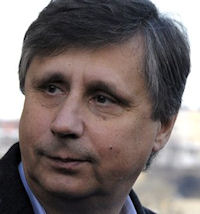Czech Republic - Politics - 2000s
 Social Democrats were in power from July 1998 to June 2006. In June 2002 the CSSD repeated its success (30.2%) from 1998. However, in contradistinction to its former minority government, it now formed a coalition with so called 4-Coalition (KDU-CSL, Freedom Union, Democratic Union, ODA) which enabled the new chief of the party Vladimír Spidla to create a majority government by using the smallest possible majority of votes (101) in Parliament. In his former post as Labour and Social Affairs Minister before he became Prime Minister, Vladimir Spidla was not very successful in fighting unemployment in the Czech Republic.
Social Democrats were in power from July 1998 to June 2006. In June 2002 the CSSD repeated its success (30.2%) from 1998. However, in contradistinction to its former minority government, it now formed a coalition with so called 4-Coalition (KDU-CSL, Freedom Union, Democratic Union, ODA) which enabled the new chief of the party Vladimír Spidla to create a majority government by using the smallest possible majority of votes (101) in Parliament. In his former post as Labour and Social Affairs Minister before he became Prime Minister, Vladimir Spidla was not very successful in fighting unemployment in the Czech Republic.
In June 2004, after a reverse of CSSD in the European elections followed by loss of support in its own party Vladimír Spidla resigned from both the Prime Minister and the party leader functions. A new majority government was formed by the former vice-chairman of CSSD Stanislav Gross in cooperation with the same coalition partners (except ODA).
In April 2005 Prime Minister Gross was compelled to resign due to the unclear financing of his private apartment. A new, personally modified government was formed by the minister of regional development Jirí Paroubek. The government of Prime minister Jiri Paroubek (CSSD) consisted on the basis of the opposition agreement of the Social Democratic Party, the Christian and Democratic Union - Czechoslovak People´s Party and the Freedom Union - Democratic Union.
 The election to the Chamber of Deputies that took place on 2 -3 June 2006 produced an evenly balanced result. One potential coalition -- the Civic Democrats (ODS), Christian Democrats (KDU-CSL) and Greens (SZ) -- took 100 seats, exactly half. The Social Democrats (CSSD) and Communists (KSCM) comprised the other half of the chamber, making the possibility of a minority Social Democratic government supported by the Communists equally problematic. This suggested that forming a stable government that would last four years would be difficult.
The election to the Chamber of Deputies that took place on 2 -3 June 2006 produced an evenly balanced result. One potential coalition -- the Civic Democrats (ODS), Christian Democrats (KDU-CSL) and Greens (SZ) -- took 100 seats, exactly half. The Social Democrats (CSSD) and Communists (KSCM) comprised the other half of the chamber, making the possibility of a minority Social Democratic government supported by the Communists equally problematic. This suggested that forming a stable government that would last four years would be difficult.
The impasse led to months of protracted negotiations during which Prime Minister Mirek Topolanek formed a three-party coalition with the Christian Democrats (KDU-CSL) and the Greens (SZ). The right-wing minority Czech government of Prime Minister Mirek Topolánek who came into office on 16 August 2006 failed to win a confidence vote 96-99 in the parliament on 3 October 2006, i.e. 30 days after the whole government was nominated by the President. This was the first time a Czech government was given a no-confidence vote since the country was independent in 1993. As a result, Topolánek's government resigned and operates as a temporary government only. On 8 November 2006 the president asked Topolanek to form another government. The possibilities included creating a grand coalition, assembling a caretaker government to take the country into early elections, or hoping somebody can make 101 of Parliament's 200 voices sing together long enough for a confidence vote. But some seven months after the election, on January 19, 2007, the coalition succeeded in its second attempt when two renegade parliamentarians from the opposition Social Democrats (CSSD) abstained.
By early 2009 the coalition of the Civic Democrats, the Christian Democrats and the Greens could count on 96 votes in the 200-member lower house, while the opposition stood one better. The coalition came under pressure in Parliament, when the opposition managed to attach the radar treaties with the US to the agenda - with good prospects of voting them down. The opposition had failed to bring down the cabinet on four previous occasions. Civic Democrat rebels - dissatisfied with their party on everything from taxation to the Lisbon Treaty, as well as former Green Party members recently expelled from their party ranks, held the key.
 On March 24, 2009, the coalition government lost a vote of no-confidence, and resigned two days later, although it stayed in power until May 8 when a new interim, technocratic government was sworn in. Jan Fischer, who had been serving as the head of the Czech Statistical Office, was named Prime Minister. Despite the fact that the two largest parties were talking about early elections, it was extremely difficult under the Czech Constitution to trigger early elections. It was only intended that Jan Fischer's caretaker government would act until the early elections that were originally planned for October 2009. In a last-minute decision, the Social Democrats (CSSD) withdrew their support for early parliamentary elections planned for October.
On March 24, 2009, the coalition government lost a vote of no-confidence, and resigned two days later, although it stayed in power until May 8 when a new interim, technocratic government was sworn in. Jan Fischer, who had been serving as the head of the Czech Statistical Office, was named Prime Minister. Despite the fact that the two largest parties were talking about early elections, it was extremely difficult under the Czech Constitution to trigger early elections. It was only intended that Jan Fischer's caretaker government would act until the early elections that were originally planned for October 2009. In a last-minute decision, the Social Democrats (CSSD) withdrew their support for early parliamentary elections planned for October.
Following the decision of the Constitutional Court, which annulled the early elections, the mandate of Jan Fischer's caretaker government was extended to more than double its originally planned length from 08 May 2009. Regular elections were scheduled for June 2010, and until then the Czech Republic was governed by a caretaker government of experts.
The Chamber of Deputies gave Jan Fischer's government a vote of confidence on 7 June 2009 after which it successfully completed the Czech presidency of the European Union in this formation. One of the main challenges facing Fischer's government during the period of economic crisis was to draft a proposed state budget which would prevent any further increase of the already high deficit. It had to adopt a series of reform measures aimed at reducing state expenditure and maintaining the budget deficit under five percent of gross domestic product. The caretaker government had been successful in this area, but at the cost of having to adopt additional measures after budget debates in Parliament.
|
NEWSLETTER
|
| Join the GlobalSecurity.org mailing list |
|
|
|

